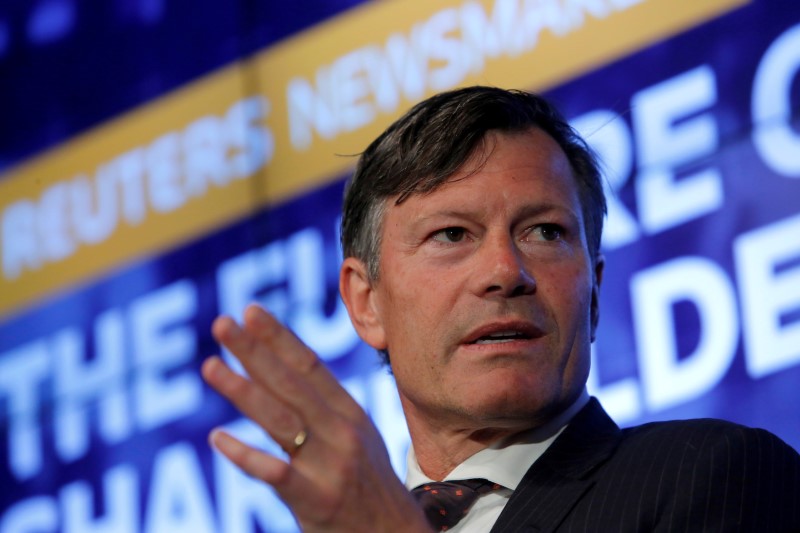By Svea Herbst-Bayliss
NEW YORK (Reuters) - Investor Jeffrey Ubben, already betting there is money to be made from coaxing corporations into being better citizens, gained an ally on Tuesday when BlackRock Inc (N:BLK) chief Laurence Fink told companies to tackle climate change or face his wrath.
Ubben, who founded $17 billion ValueAct Capital in 2000, spent a year building an ESG portfolio and is fast becoming one of Wall Street's biggest evangelists for investments with strong environmental, social and governance components.
Now a like-minded and powerful investor has joined the crusade as Fink sent his annual letter to corporate chiefs warning them to act or face anger from investors like BlackRock over how unsustainable business practices might curb their future wealth.
"It is pretty exciting," Ubben said at a Reuters BreakingViews event on Tuesday when asked about Fink sounding the alarm on a crisis that Fink called the most long-term and structural in his over 40-year long career in finance.
For Ubben and other investors pushing for changes on things ranging from carbon emissions to safer workplaces for employees, BlackRock's new stance may aid their work. Fink said BlackRock, which invests $7 trillion and is the world's biggest asset manager, would be "increasingly disposed" to cast critical proxy votes tied to sustainability.
"Now I can call three shareholders," Ubben said, referring to index funds BlackRock, Vanguard and State Street (NYSE:STT).
"If I can turn that vote on, (these changes) can happen fast. It is pretty cool."
Three years ago Ubben elevated a long-term partner, Mason Morfit, to chief investment officer at ValueAct and took time to step back and lay the ground work for the ValueAct Spring fund. The fund quickly attracted over $1 billion but Ubben then hit the pause button and began turning potential investors away.
"I want to go slowly," Ubben said, noting that he needs to take time to construct the fund carefully and spend time identifying the portfolio companies. And he still has to find ways to catalyze real change with these types of investments.
One of the Spring fund's investments is Hawaiian Electric (N:HE) where Ubben has been pushing for the company to consider outsiders to replace CEO Constance Lau. Ubben said ValueAct is working with the company and declined to say whether he wants a board seat to help hasten change.
Ubben said most companies were guilty of short-term thinking, and only about a third of corporate chiefs want to do good by, for example, investing in clean energy or boosting employee wages.
The remainder were simply trying to shield themselves from activist investors like himself, he added.
But as ESG investing captures investors' imagination - investors funneled $20.6 billion in net new money into these types of funds last year, according to Morningstar data - Ubben said it can become the path to breaking the short-term investing mold.
"ESG, that's the ticket that's how we get the long-term back," he said.
Paving the road to real change requires "courage and getting off the 90 day clock," Ubben said, referring to the typical company reporting cycle.
Ubben said that in recent years he has stopped growing his own net worth and gives away his income. But not everyone in the hedge fund industry is as generous, he acknowledged.
"This is an industry populated by people who have a (money) hoarding problem," he said.
